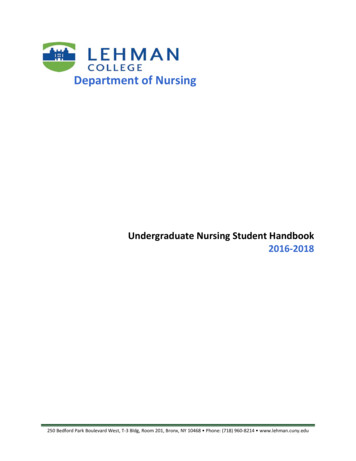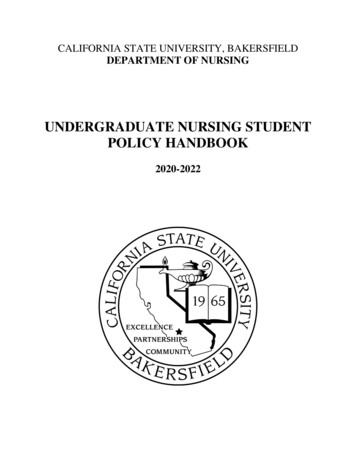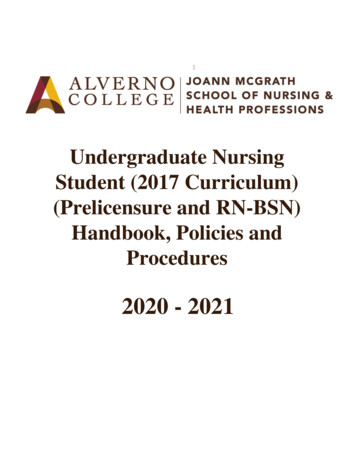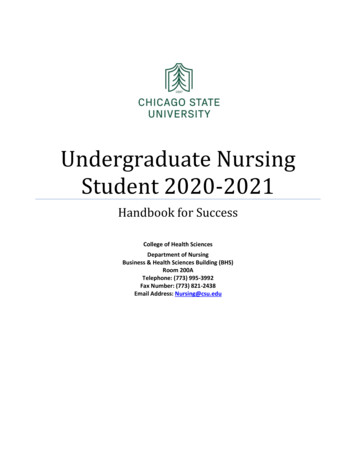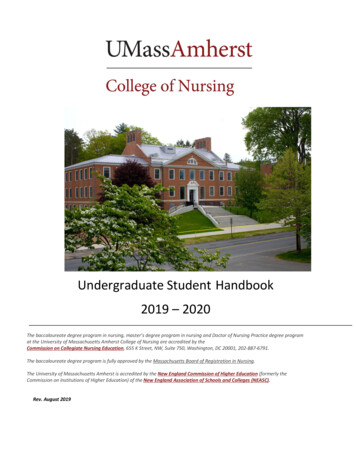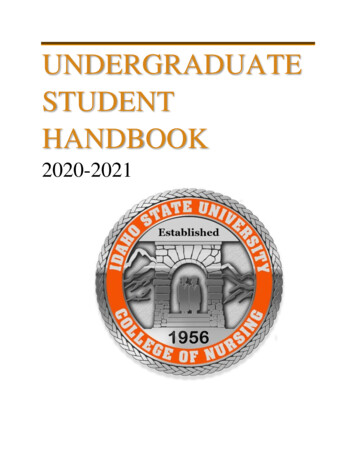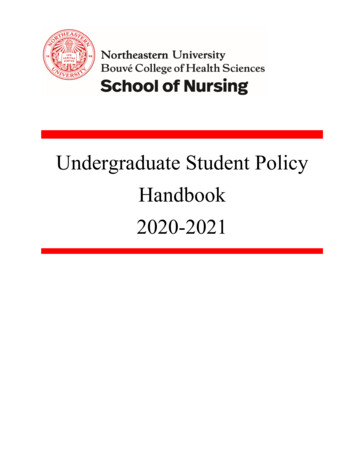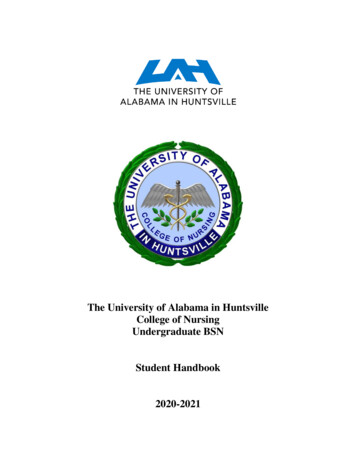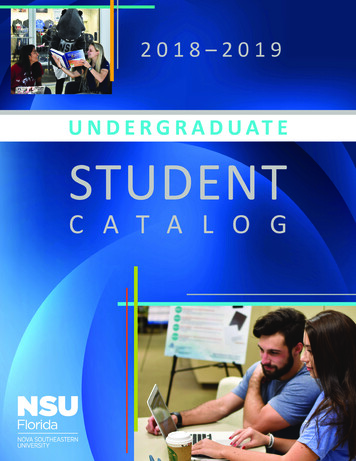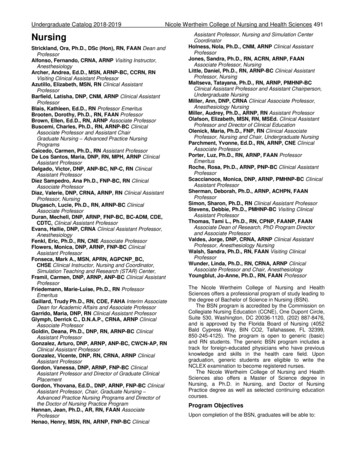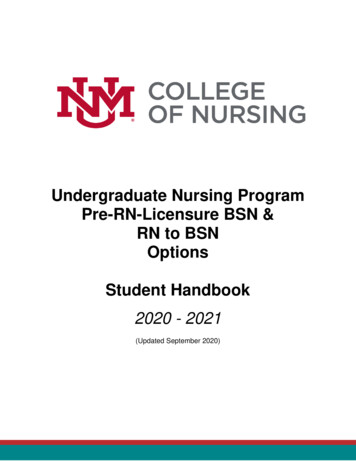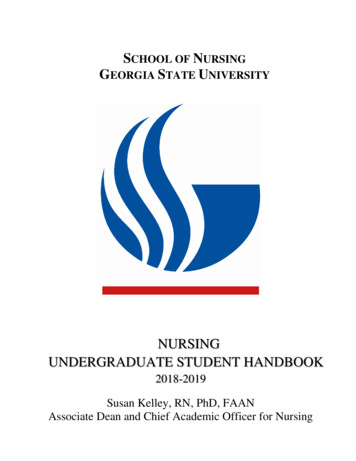
Transcription
SCHOOL OF NURSINGGEORGIA STATE UNIVERSITYNURSINGUNDERGRADUATE STUDENT HANDBOOK2018-2019Susan Kelley, RN, PhD, FAANAssociate Dean and Chief Academic Officer for Nursing
School of NursingUndergraduate HandbookTABLE OF CONTENTSPageNote to the Student: .6Introduction .7Program Approval and Accreditation .9Degree Awarded .9General Information .10Locations .10Assistance .10Undergraduate Curriculum .11Undergraduate Nursing Major Courses .11Electives and Special Courses .11Undergraduate Clinical Experiences.11Suggested Program Plans .12Critical Care Nursing Course (NURS 4210) .12Directed Readings (NURS 4040).12Nursing Knowledge and Nursing and Health Assessment Skill (NURS 2220) .12Clinical Information and Policies .13Statement of Release: .13Infection Control/Bloodborne Pathogens .14Health Forms and Other Clinical Documentation .14Assignment of Clinical Placement .14Drug Calculation Policy .14Attendance .15Tardiness .15Uniform/Dress Policy .15Incident/Accident Reporting .17Student Evaluation of Clinical Faculty .17Evaluation of Student Clinical Performance .17Grading Policy .18Minimum ComputerRequirements 18Standardized Tests .18Retention Policies .18Professional Behaviors Policy .19Meeting of First Class .19Page 2 of 69
School of NursingUndergraduate HandbookTABLE OF CONTENTSPageClass Attendance .19Disruptive Behavior in Classroom and/or Clinical Setting Policy .19Electronic Equipment.20Announcements and Communications Via Electronic Sources .20The Impaired Student .20Students on Medication.20Students with Health Problems .20Program Plan Progression.21Change of Program of Study. Error! Bookmark not defined.Progression Policy .22Repeat to Replace Policy .22Termination Policy.22Re-entry Policy – After Absence .22Transfer Policy: .23Re-application to the Nursing Program Following Termination .23Conditions of Admissions .23Validation Process .23Failure Policy for Re-admitted Students .24Students Rights and Responsibilities .24References/Recommendations .24Privacy .24Conferences.24Student Progress.24Due Process .24Student/Faculty Advisor Program (SFAP) .25Procedure for Change of Faculty Advisor .25Student Employment .25Class Cancellation/School Closure .25Communications/Information Sharing.26Evaluation .26Faculty and Course .26Program .26Students .26Page 3 of 69
School of NursingUndergraduate HandbookTABLE OF CONTENTSPageGraduation Procedures .26Georgia Legislative & Regents’ Requirements for Graduation .26Georgia State University Graduation Requirements.27Application for Graduation .27Traditional and ACE End of Program Completion Activities .27Application for Licensure Examination for the Registered Professional Nurse .28Student Life .28Student Committee Participation .29University Committees .29Student Senate .29Faculty Senate .29Byrdine F. Lewis College of Nursing and Health Professions Committees .30Student Services Committee .30Academic Affairs Committee .30School of Nursing Committees .30Organizations .30Nursing Students at Georgia State.30Sigma Theta Tau International Honor Society of Nursing - Epsilon Alpha Chapter.30Scholarships .31Nursing Scholarships .31Additional Scholarships / Loan Forgiveness Programs .31University Honors .31School of Nursing Honors .32Honors in Nursing .32Evangeline Lane Founders Award .32Sigma Theta Tau Undergraduate Academic Achievement Award .32SON Undergraduate Leadership Award .32Appendix A: Program Plans Suggested Curriculum Plan – B.S. Degree with a Major in NursingTRADITIONAL OPTION .33FALL ADMISSION .33Appendix A-II: Program Plans Suggested Curriculum Plan – B.S. Degree with a Major in NursingTRADITIONAL OPTION SPRING ADMISSION .34Appendix A-III: Program Plans Suggested Curriculum Plan – B.S. Degree with a Major in NursingACE OPTION FALL ADMISSION .35Appendix A-IV: Program Plans Suggested Curriculum Plan – B.S. Degree with a Major in NursingACE OPTION SPRING ADMISSION .36Appendix B - Permission to Release Education Record Information Form .37Page 4 of 69
School of NursingUndergraduate HandbookTABLE OF CONTENTSPageAppendix C – Statement of Understanding Concerning Clinical Schedules .38Apendix D – Statement of Release .39Appendix E – Directed Reading .40Appendix F – Infection Control Guidelines.45Appendix G – Hepatitis B Vaccine Election Form .46Appendix H – Health Forms and Other Clinical Requirements Policy .47Drug Screens & Criminal Background Check .48Appendix H – Health Forms and Other Clinical Requirements Policy (continued).49Appendix I – Clinical Evaluation Process .50Appendix J – Overriding Behaviors .52Appendix K--Clinical Failure Notification .56Appendix L – Essential Functions Policy .58Appendix M – Professional Behaviors Policy .61Appendix N – Georgia Registered Professional Nurse Practice Act .66Appendix O – Student Agreement for ACE Option .67Appendix P – Selected Administrative Resources.68NOTES .69Page 5 of 69
School of Nursing Undergraduate 627Note to the Student:This Handbook is designed to facilitate progression through the program in nursing and should bemaintained as a source of reference.The policies, guidelines and resources outlined herein are generally applicable to the BaccalaureateNursing Programs and are consistent with those of Georgia State University. Policies of theUniversity and a list of students' rights and responsibilities are outlined in the GEORGIA STATEUNIVERSITY CATALOG: All specific course policies will be found in each course syllabus.Inherent in all policies of the University and the School of Nursing is the student's right to dueprocess. (See page 24 or go to www.gsu.edu/appeals)Every effort is made to ensure that each student is aware of and has access to the contents of thishandbook. Each semester the handbook is updated and reviewed to ensure consistency and accuracy.A copy of the most recent handbook is available on the web site under current students and thesubsection Policies and Procedures (http://nursing.gsu.edu/25.html)If you have questions please contact:School of NursingRecords and Information (Front Office)Room 900 Urban LifeTelephone: 404-413-1200The Faculty and Staff wish you an enjoyable and successful learning experience as you complete thenursing curriculum.Page 6 of 69
School of Nursing Undergraduate Handbook28Introduction2930313233343536The School of Nursing (SON) at Georgia State University is a unit of the Byrdine F. Lewis Collegeof Nursing and Health Professions. Student and faculty of the School engage in teaching, scholarlyendeavors, and service activities that improve health and well-being within a multi-cultural society.This is accomplished through a unique professional and academic interdisciplinary environment anda community-focused approach that enriches student learning, fosters leadership development, andfurthers the pursuit of science. The SON vision, mission, and philosophy are congruent with that ofthe university.37Vision Statement38394041The School of Nursing will be nationally recognized for innovative, responsive educationalnursing programs focused upon diversity, urban healthcare and vulnerable populations. Theschool will be noted for expert practitioners, community partnerships and leading-edgeresearch.425/7/200743Mission Statement44454647The mission of the School of Nursing is to create a premier multicultural learningenvironment that produces leaders, clinicians, scholars and researchers who exemplifynursing excellence and enhance healthcare delivery to Georgia and beyond.5/7/200748Philosophy Statement4950515253545556575859606162The philosophy of the School of Nursing is congruent with and flows from the mission ofGeorgia State University and the Byrdine F. Lewis College of Nursing and HealthProfessions. The philosophy is reflective of the faculty’s belief about the concept of thenursing meta-paradigm (nursing, health, human environment) and their beliefs about teachingand learning. The philosophy is founded in and shaped by our core values: honesty/integrity,professional excellence, collegiality/collaboration, cultural sensitivity/diversity, andcreativity/innovation. The faculty is dedicated to teaching, research and service andrecognizes and honors the value of interdisciplinary exchange. The faculty members believethat education for nursing should be founded in the liberal arts and sciences. Thebaccalaureate program of study prepares the generalist for entry into professional nursingpractice. Master’s level education prepares the graduate for advanced practice as a clinicalnurse specialist, nurse practitioner or as a leader in health care and/or informatics/technology.Education at the doctoral level prepares nurse scholars in the areas of research, practice andeducation.6364Undergraduate Program Objectives65Learning objectives of the undergraduate program are to prepare graduates who:66671. Integrate knowledge of self, the arts and sci
29 The School of Nursing (SON) at Georgia State University is a unit of the Byrdine F. Lewis College 30 of Nursing and Health Professions. Student and faculty of the School engage in teaching, scholarly 31 endeavors, and service activities that impro
